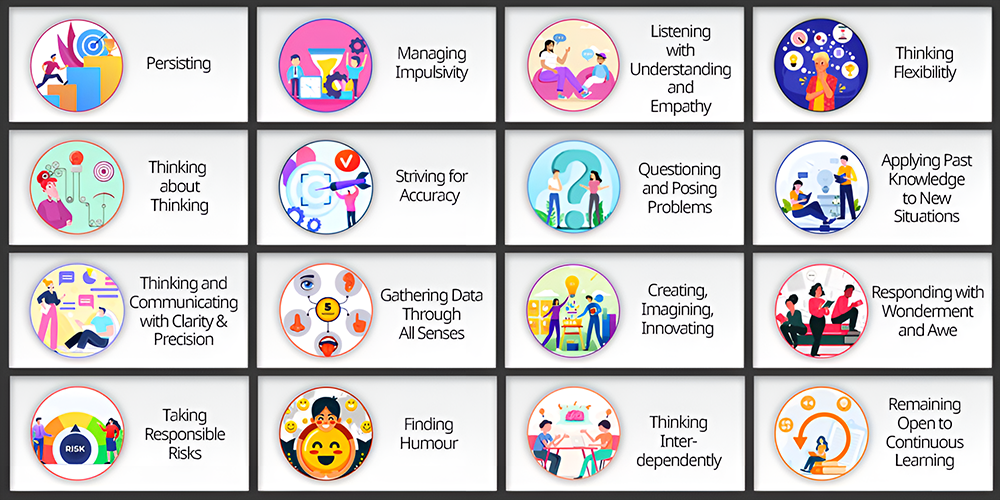
Are you a great problem solver ?
In a world that is increasingly complex and fast paced, the ability to think critically everyday does not come naturally to everyone.
Problem based learning and project based learning give us an opportunity to Deepen our knowledge and expand the skill set, but is it even possible ?
In every aspect of life whether it be education, workplace, or personal life, achievements are no longer measured by the knowledge we have but rather how effectively we apply those knowledge in real world situations providing solutions to our problems.
Art Costa and Bena Kallick introduced us to the “Habits of Mind– 16 characteristics of an effective problem solver that have been derived from a study of efficacious problem solvers from many walks of life.
The habits of mind are a universal framework of thinking, a set of 16 dispositions or thinking behaviours that are desirable attributes for learning and living productively in a complex world.
We can use these habits when confronted with problems and situations to which the answers are not immediately apparent.
When we intentionally implement these habits of the mind, we become more thoughtful, responsive, and innovative. Our students can grow their capacity as efficacious thinkers to navigate and thrive in the face of unprecedented change.
Being introduced 30 years ago it still continues to be relevant as a framework for thinking, and is about committing to growth both individually and as a community.
Over these years it has proved to be more thoughtful, responsive and innovative in situations spreading wide of cross from social to political or even the economic changes.
Habits of mind, disposition or a thinking behaviour acting as a desirable attribute for learning life in a complex world.
These habits are often used in a situation to confront a problem or provide answers to a situation that are not immediately known with time and a growth oriented language.
We aim for a larger goal, and it starts early by using skills to perform better under challenging conditions that demand strategic reasoning and insightfulness to resolve complex problems. It helps childrens to develop problem solving and analytical skills.
Just knowing about the habits of mind is not enough. Employing the habits of mind requires a composite of many skills, attitude cues, past experience and proactive reactions.
Contents
- 1 The 16 Habits of Mind To Make Learning And Growing Fun
- 1.1 1. Persisting
- 1.2 2. Managing Impulsivity
- 1.3 3. Listening with Understanding and Empathy
- 1.4 4. Thinking Flexibly
- 1.5 5. Thinking about Thinking
- 1.6 6. Striving for Accuracy
- 1.7 7. Questioning and Posing Problems
- 1.8 8. Applying Past Knowledge to New Situations
- 1.9 9. Thinking and Communicating with Clarity & Precision
- 1.10 10. Gathering Data Through All Senses
- 1.11 11. Creating, Imagining, Innovating
- 1.12 12. Responding with Wonderment and Awe
- 1.13 13. Taking Responsible Risks
- 1.14 14. Finding Humour
- 1.15 15. Thinking Interdependently
- 1.16 16. Remaining Open to Continuous Learning
- 2 Why These Habits Matter
The 16 Habits of Mind To Make Learning And Growing Fun
1. Persisting
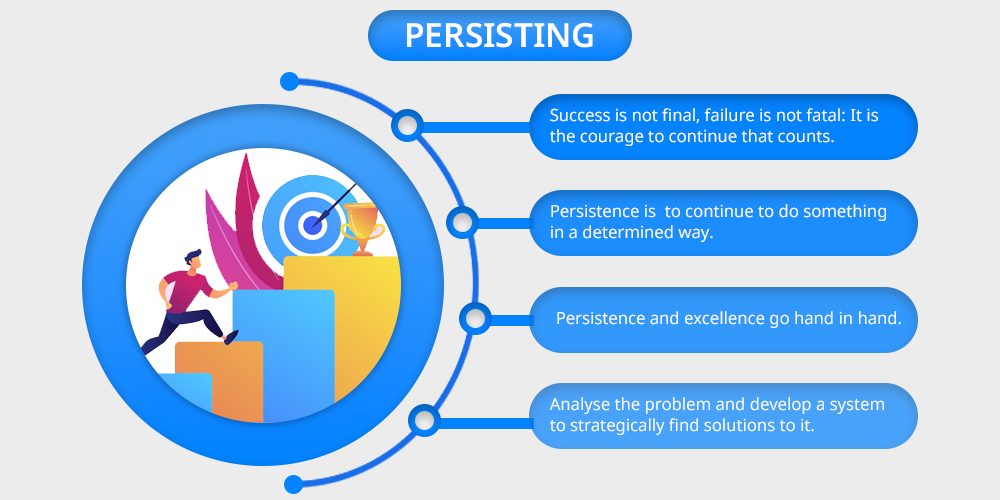
“Success is not final, failure is not fatal: It is the courage to continue that counts.” — Winston Churchill
Do you ever give up when the answer to a problem is not immediately found? Do you ever say to yourself, “I can’t do this,” “It’s too hard?” We all have faced this from time to time.
Persistence is to continue to do something in a determined way even when facing difficulties or opposition.
Persistence and excellence go hand in hand, efficacious people often stick to tasks until it is completed.
People with such a mind set analyse the problem and develop a system to strategically attack it and even employ a range of alternative strategies. as backup.
When you recognize that you are stuck, think about some possible strategies, such as:
- Stop and analyze what the problem was asking in the first place
- Break the problem apart into steps
- Think of another strategy and try it
- Seek help or feedback from someone
- Take a break. Sometimes walking away from a problem and doing something else opens up new ideas
It may be helpful to keep your own list of ideas and share with others. Keep telling yourself to hang in there and stick to it.
2. Managing Impulsivity
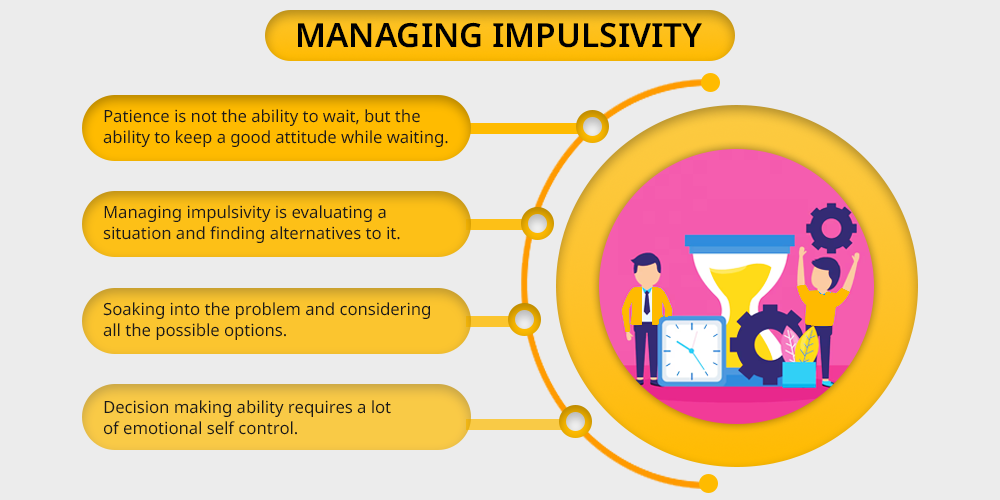
“Patience is not the ability to wait, but the ability to keep a good attitude while waiting.” — Joyce Meyer
Managing impulsivity means thinking before acting. You work to remain calm, thoughtful, and deliberate when working through a problem or developing an idea.
So, what does it look like when you are managing impulsivity? Here are some tips:
- Consider the situation you are in. How does it make you feel? How might you manage those feelings so that you can take appropriate action?
- When you are working in a group, establish group rules to make certain that everyone has a voice in the discussion.
- Count to 3 before adding your ideas to the conversation.
- Remind yourself that how you are feeling does not need to be acted on. Name the emotion and then wait instead of getting carried away into a response or a reaction.
- Be aware of the impact of your impulse to act.Slow down before responding. Stop and think before you act.
Managing impulsivity involves taking the time to evaluate a situation and consider possible options before making any decision.
Managing impulsivity is all about taking time and soaking into the problem and considering all the possible options out there.
The ability to deny impulse decision making requires a lot of emotional self control and it directly reflects the plan of action and the achievement .
3. Listening with Understanding and Empathy
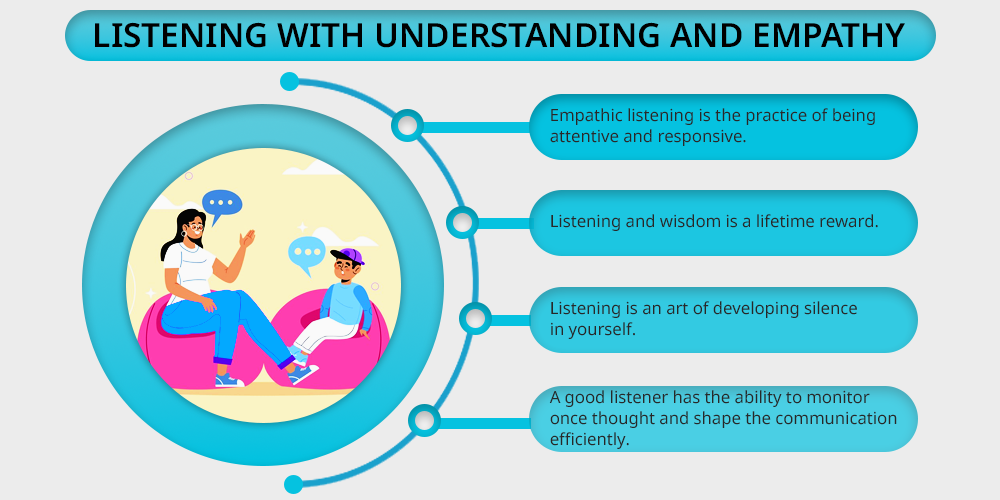
Empathic listening is the practice of being attentive and responsive to others’ input during conversation. Understanding comes with listening and wisdom is a lifetime reward for the same.
Being able to phrase another person’s ideas, detecting their feelings and emotional state is the most powerful indication of listening behaviour.
Listening is an art of developing silence in yourself to slow your mind and hear the meaning beneath words.
As said by many a good listener tries to understand what another person is saying and that provides him the ability to monitor once thought and shape the communication in a way to empathise and take into account their point of view.
A strategy you can use for becoming a better listener is the 3 Ps: pause, paraphrase, and probe.
4. Thinking Flexibly
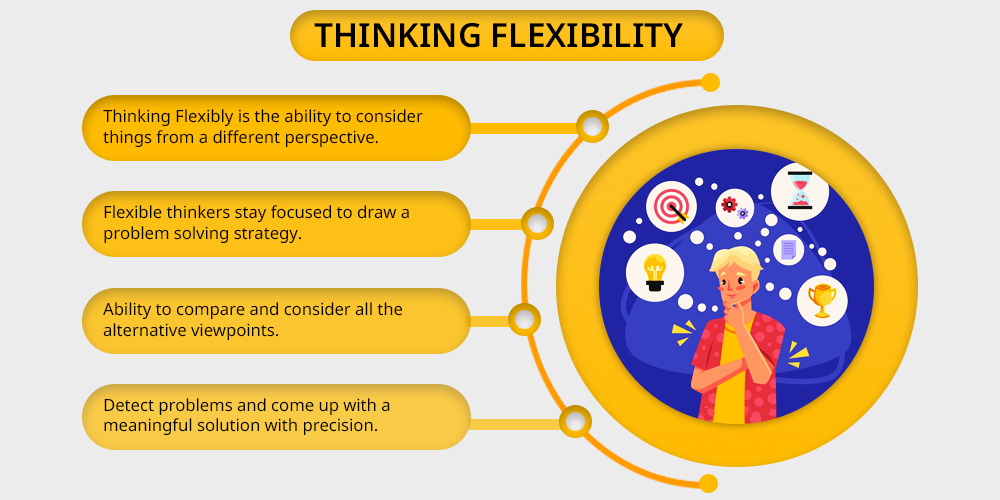
“The measure of intelligence is the ability to change.” — Albert Einstein
Thinking Flexibly is the ability to consider things from a different perspective, or to change your mind when appropriate.
Flexible thinkers stay focused on the challenge at hand, draw upon a range of strategies. They create and seek novel approaches and consider possible consequences.
It is really important to understand that in order to draw a problem solving strategy, one must compare and consider all the alternative viewpoints with several sources flexibly to detect the most meaningful option and an approach that has more precision and conceptual orientation.
5. Thinking about Thinking
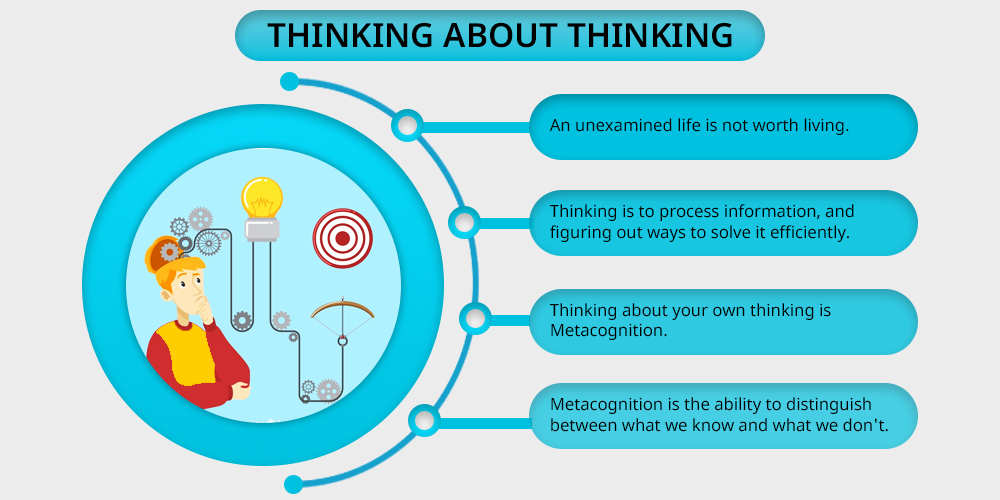
“An unexamined life is not worth living.” — Socrates
Thinking about examining how we take in and process information, and figuring out ways we can solve the problem at hand more efficiently.
Thinking about your own thinking or Metacognition is the ability to distinguish between what we know and what we don’t.
This metacognitive capacity enables us to plan and execute a strategy, to monitor our own steps, and reflect and evaluate how it went.
Try it next time you are faced with a challenge and you are not sure what to do. Think strategically by asking:
- What are my specific goals before I begin?
- What might be a strategy to start with?
- What have I learned from other problems like this one?
- Is there a different strategy that I can use? Have I considered the other options when solving this problem?
- What do I really need to do to get the best results?
- How can I use what I’ve learned from this problem when solving similar problems in the future?
6. Striving for Accuracy
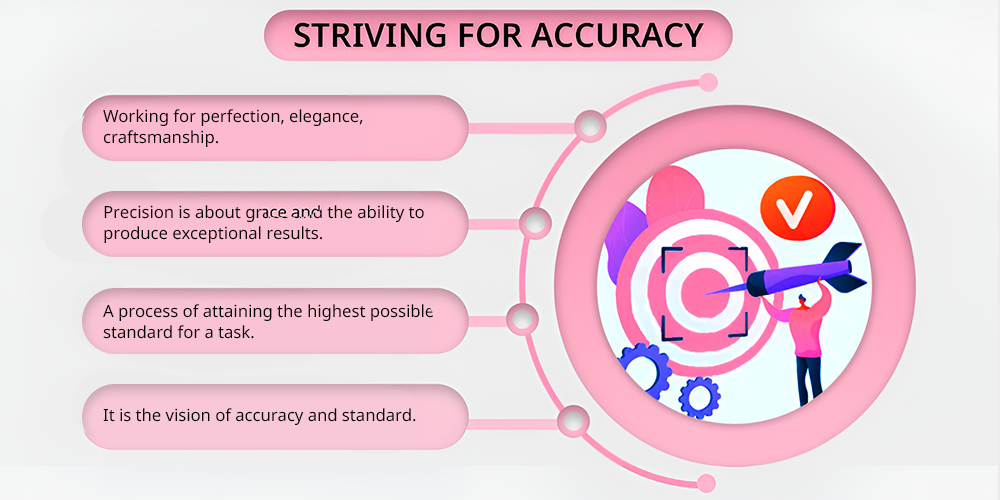
“Quality is not an act, it is a habit.” — Aristotle
What is it? – Working for perfection, elegance, craftsmanship.
Precision is about grace, it is a desire for craftsmanship, mastery , flawlessness and the ability to produce exceptional results in everyday life.
People with such quality value perfection in themselves, it does not come naturally to everyone; it is a continuous process to attain the highest possible standard to accomplish a task.
For some people it requires continuous reworking and for some it is in ongoing learning to bring out their vision of accuracy.
Too often we think of accuracy and precision as the end game, we complete the task and move on. No matter how good you are at something, craftsmanship requires continuous reworking to grow your expertise.
Here are some strategies to consider to motivate you to set goals to continue toward even greater work:
- Organize yourself so that you have the time to put careful attention to your work
- Ask others to give you specific feedback on questions you have about your work
- Study the work of experts in the field in which you are interested to learn more about their craftsmanship
- Assess your work in progress and identify possible next steps
- Recognize when you are getting better at what you are working on to give you the encouragement and inspiration to become even better at it.
- Verify claims with credible facts and evidence. Be alert to misinformation, and trustworthiness of media sources.
7. Questioning and Posing Problems
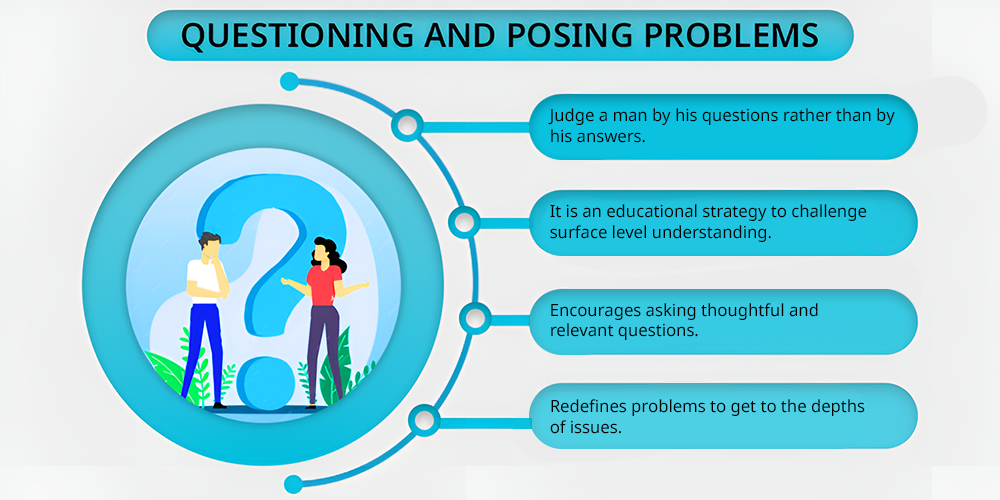
“Judge a man by his questions rather than by his answers.” — Voltaire
Curiosity drives learning.Those who question and pose problems display curiosity to discover new solutions and build a motivating mindset.
When they engage in persistent information-seeking behaviour they begin to fill the gaps between what they know and what they don’t know.
When they do not accept surface level knowledge, they strive to get to the depths of issues.
8. Applying Past Knowledge to New Situations
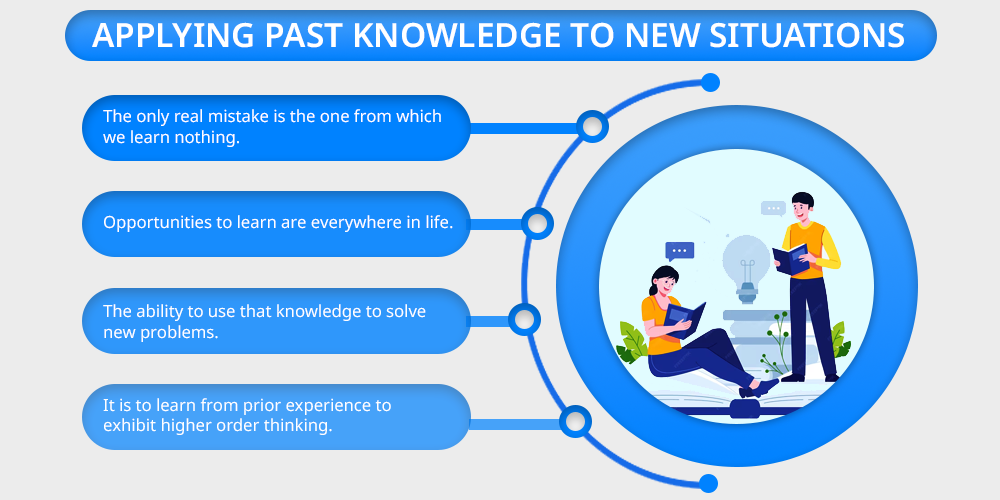
“The only real mistake is the one from which we learn nothing.” — Henry Ford
Opportunities to learn are everywhere in life, and the greatest force is the ability to use that knowledge to solve new problems.
Those individuals who in one way or another learn from prior experience and knowledge to address an unfamiliar issue, exhibit higher order thinking. Transfer of learning to a new situation builds your intellectual muscles.
Learning is not just an accumulation of isolated facts or skills — it is finding the connections or patterns that paint a bigger picture that is more easily stored in your memory for future use. We learn from reflecting on and making sense of our past experiences.
Therefore, such individuals replicate prior learning, transferable from one context to another, and thus improve problem-solving and decision making in new contexts..
9. Thinking and Communicating with Clarity & Precision
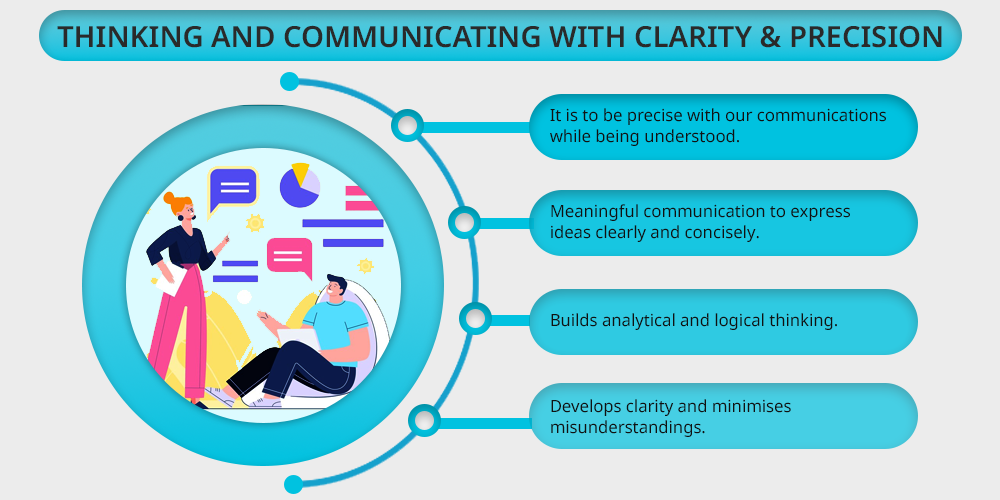
“The single biggest problem in communication is the illusion that it has taken place.” — George Bernard Shaw
What does this even mean? – This means Being very precise with our communications, avoiding exaggeration or understatements, and being clearly understood.
Language and thinking are closely entwined. Meaningful communication starts with ideas that are well articulated.
When people progress to the level of saying or expressing their ideas clearly and concisely, the thinking becomes refined, which produces a better end product.
The individuals who use analytical and logical thinking regarding speech and writing never use vague terms and make everyone confused.
In both verbal or written communication, clarity minimises misunderstandings right from the intended message passers on to the receivers. Your words represent your mind. When you use fuzzy language, it is a reflection of fuzzy thinking.
As you strive to communicate more precisely and accurately, you become a better messenger of your ideas. Instead of using overgeneralizations you support statements with explanations, comparisons, quantification, data, and evidence.
10. Gathering Data Through All Senses
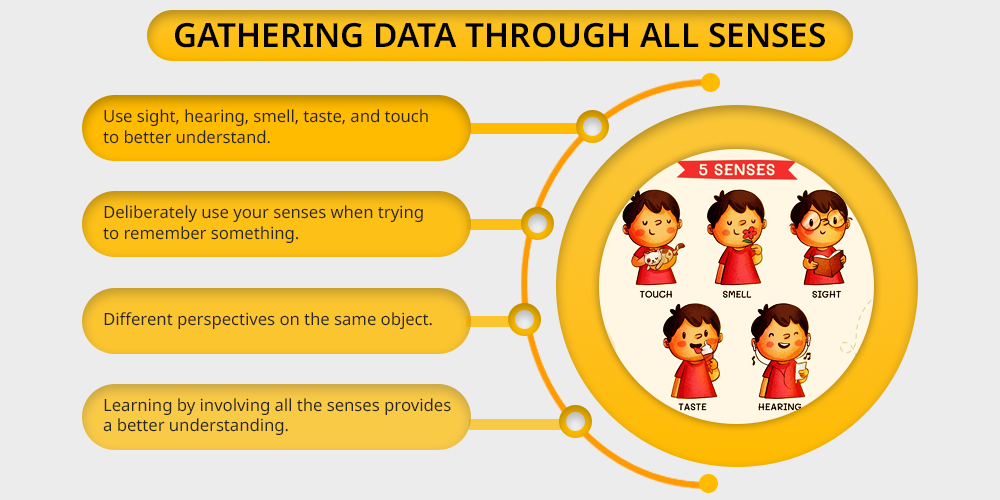
“Observe everything. Experience joy in simple things.” — Yoko Ono
When you gather data through all senses, you. use sight, hearing, smell, taste, and touch to better understand the world around you.
- Reality is more profound when a person observes and acts through experiences
- Pay attention to the world around you. Ask yourself:
- What am I noticing in my environment?
- What details capture my attention?
- Deliberately use your senses when you are trying to remember something.
- When engaging in a new topic or problem, ask yourself, What sources of data should I consider? How is what I am experiencing impacting my thinking?
- Zoom in/ zoom out. Look at something with a magnifying glass or take digital photographs to see different perspectives on the same object.
This way you are able to see more, and have a clearer, informed perception of the significance of what is going on around you., as well as having enhanced ability to spot patterns that run periodically beneath the surface of things.
The consequence of learning as a whole person by involving all the senses is that a better and broader understanding of the problem is achieved in a problem-solving process.
For example, imagine how a school does their best to develop the child’s problem solving and analytical skills, the process stands very similar.
11. Creating, Imagining, Innovating
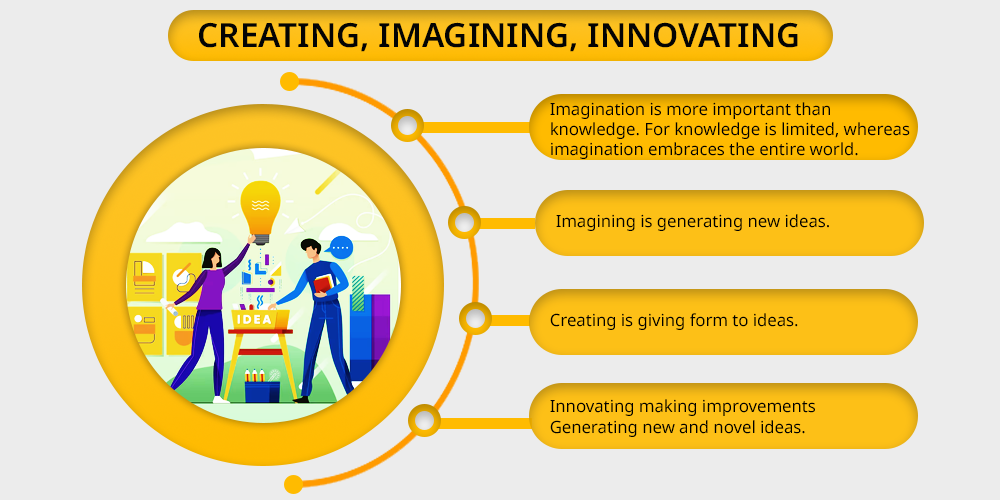
“Imagination is more important than knowledge. For knowledge is limited, whereas imagination embraces the entire world.” — Albert Einstein
What does it mean?
Imagining is generating new ideas without concern for the possible. Creating is giving form to ideas with the goal of taking something that is possible and making it come to life.
Innovating is taking an existing system or idea and making improvements Generating new and novel ideas.
Creativity cannot be explained without referring to the notion of imagination as the main component of innovation.
Scientists and inventors set out new knowledge and discover new ways of doing things; artists, architects, designers, strategists and more, advance social frontiers by producing new concepts, objects, and designs.
These capacities can be developed in small moves as well as in more formal products or creations. Some of these strategies might help you build your skills:
- Go ahead, take a risk! When you try something and it doesn’t turn out the way you hoped, it isn’t a failure. Rather, it provides a rich opportunity to analyze what went wrong, to learn, and to generate alternative strategies.
- Brainstorm unexpected ideas. Albert Einstein once said, “If at first, an idea doesn’t seem totally absurd there’s no hope for it.” Instead of feeling stuck, think outside the box.
- Don’t take yourself too seriously. Humor has been found to liberate creativity and provoke such higher-level thinking skills. When you are having fun with ideas, you begin to see possibilities and interesting ways of seeing the same things.
12. Responding with Wonderment and Awe
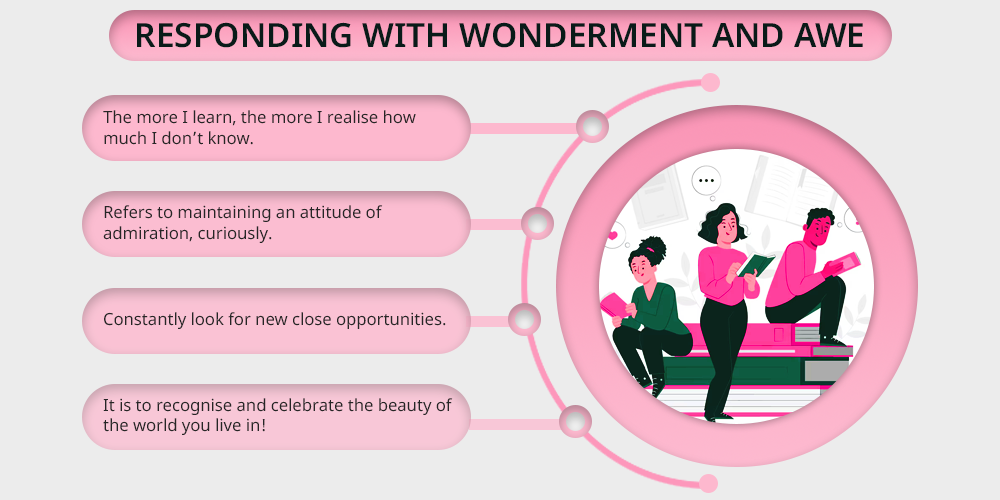
“The more I learn, the more I realise how much I don’t know.” — Albert Einstein
When the world around us sparks our interest and ignites our sense of wonder, we are inspired to learn, to explore, to imagine possibilities.
A few strategies to help provide experiences that trigger that sense of amazement and wonder:
- See, think and wonder: Pay attention to something that you may be awestruck by– ask yourself–what is it that I see here? What does it make me think about? What do I wonder?
- Explore new places. Whether these are virtual or physical experiences, give yourself time to really pay attention to what amazes you.
- Keep a Notebook or Journal. Make a list, draw, photograph, or describe experiences or ideas that you have found to be delightful or wonderous.
“Without awe, life becomes routine…try to be surprised by something every day.” — Mihalyi Csikszentmihalyi
This refers to : maintaining an attitude of admiration, curiously and with interest in the new, constantly opens the opportunity for new close opportunities.
Simply, recognise and celebrate the beauty and wonder of the world you live in!
13. Taking Responsible Risks
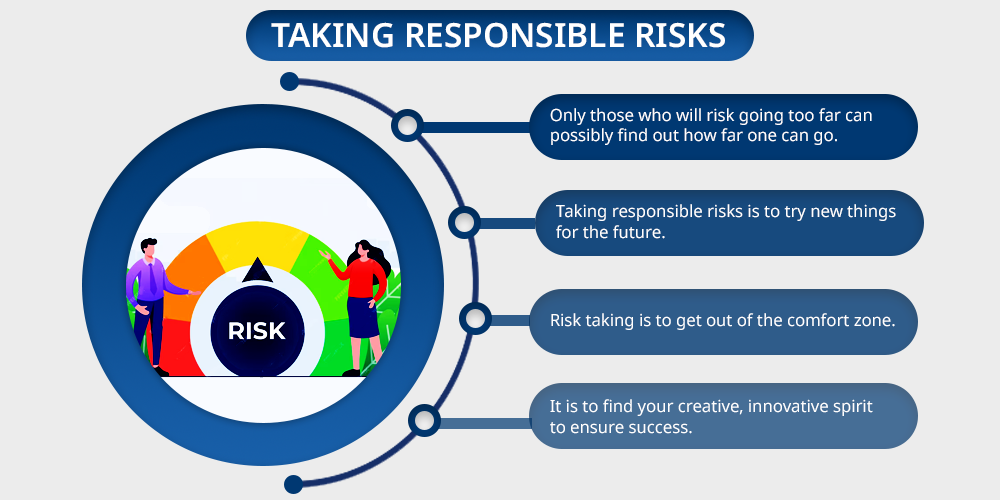
“Only those who will risk going too far can possibly find out how far one can go.” — T.S. Eliot
Taking responsible risks means being willing to try new things while being prepared for the possibility of failure.
Taking responsible risks calls on us to venture out, to attempt more than we thought we could do, and to get out of our comfort zone.
However, all risks are not worth taking. When we say “responsible” we mean that it is more of an “educated” risk–through your own experience and intuition
If you learn how to take a chance, you are likely to find your creative, innovative spirit, and that will help you to solve the problems of our complex, rapidly-changing world.
This habit of mind represents a characteristic that relates to both risk taking and thinking about it twice, which allows moving the horizons forward and doing more, while keeping in mind the prospective consequences.
14. Finding Humour
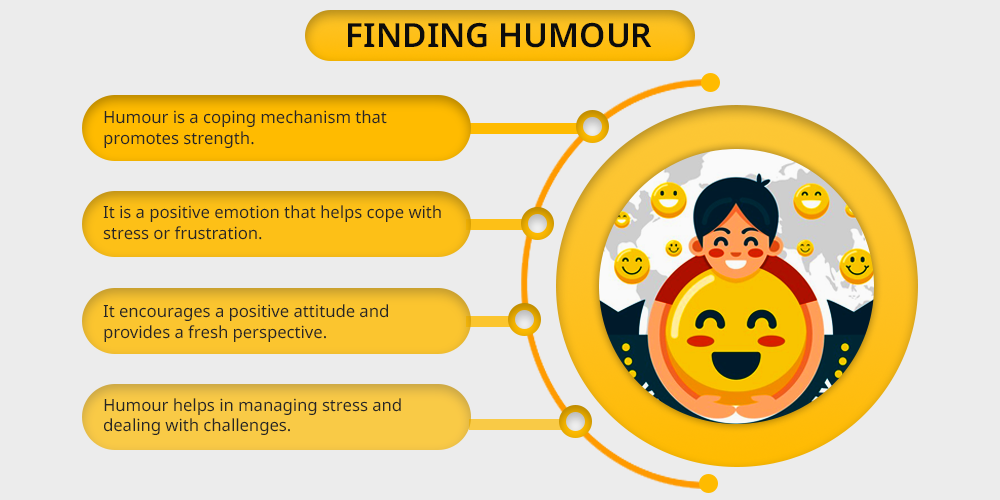
Another strength in coping with adversities is the use of humor. Positive emotions such as humour help people cope with stress or frustration.
Your appreciation and use of humour can help you bounce back from adversity and feel more resilient.
It makes the individuals lighten up, bring a break from tension or apply a new outlook to the issues. It is productive since it supports a positive attitude within the team hence adopting best strategies to solve challenges.
In a world where social media plays an important role in shaping our humour, consider what challenges faced by students in the 21st century and how do they even overcome that ?
By not taking themselves too seriously such individuals are able to manage and cope with life tasks, change and use humour to overcome hitches while dealing with challenges in life. And similarly it is very important to teach children problem solving and analytical skills.
15. Thinking Interdependently
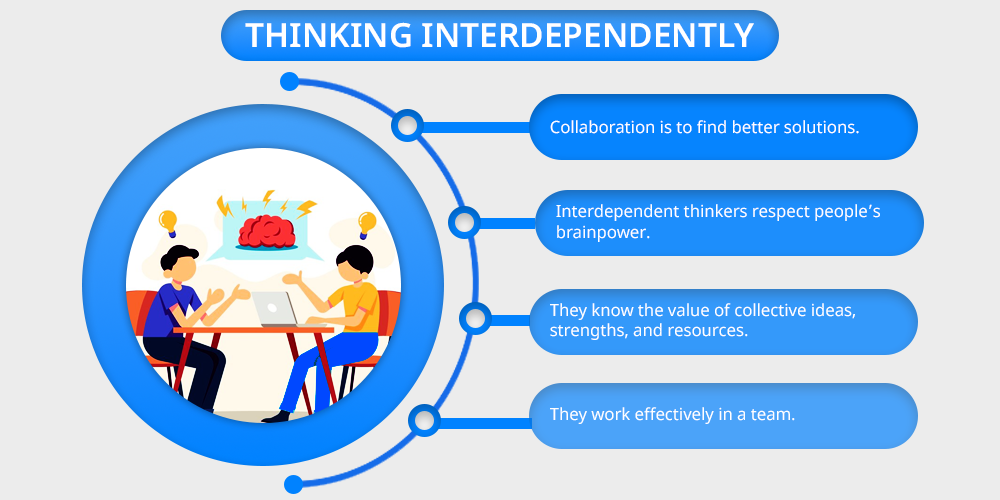
Working cooperatively and collaboratively. – by working together we can find far better solutions.
Interdependent thinkers have a sense of community. They contribute to a common goal, seek collegiality, and draw on the resources of others.
Since the world is faced with such diverse needs and problems to solve. We need to seek out and study as many points of view as we can in order to make critical decisions that impact our local, national, and global communities.
Working in groups is more than cooperation. It requires your ability to justify your ideas and to allow yourself to be open to the ideas of others.
Here are some tips to develop thinking interdependently in any group.
- Establish roles in the group to keep meetings purposeful
- Test the feasibility of solutions you pose by hearing what others think. You need to be willing and open to feedback from others in the group
- Listen closely to others and seek consensus when appropriate.
- Agree on group norms and call time out when the group is not working productively.
- Be okay with disagreements. They can be opportunities to learn, modify thinking, and generate new ideas.
- Learn how to give up on your idea when it is not working and engage with the ideas of others.
Universality of teamwork is a popular notion prevalent in almost any given task. The interdependent thinkers have respect for the group or the organisation’s intelligence or the people’s overall brainpower.
They know that in ideas and strengths, and resources from a group are better off than a single person working all alone. He also is developing the practice to listen and value the opinion of other colleagues as well as to function effectively in a team.
Individualists consider suggestions from others, and those who do not segregate themselves work harder when working in a group.
16. Remaining Open to Continuous Learning
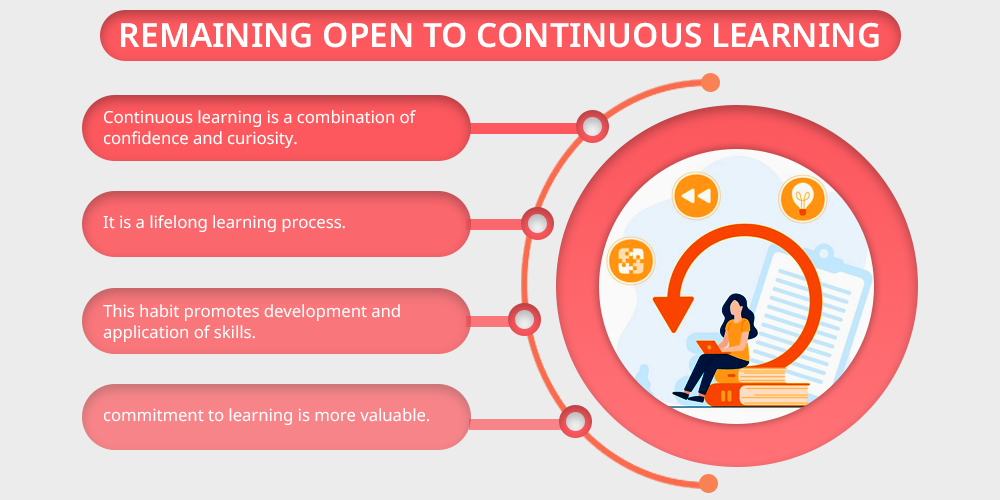
Continuous learning refers to the combination of confidence and curiosity which allows individuals to learn and grow.
A true learner never lacks knowledge that they are always looking for. The people that are amiable to conventional learning recognize the fact that education is not a process that ends at some point, but a process that will go on and on.
They get to love mystery, which makes them be ever ready to grow both in knowledge and experience.
This habit promotes development and application of flexibility, characteristics that help a person to succeed in their daily life and/or career.
In the current context, knowledge is dynamic and people need to be in a position to cope up with new conditions regularly; hence, commitment to learning is more valuable.
Why These Habits Matter
It’s not something one can achieve in a day, but mastering these habits will help you with the tools to handle complexity, ambiguity, and uncertainty.
As the world becomes more interconnected and grows dynamically, these habits foster adaptability, resilience, and an open mindset—making them invaluable.
Whether in academics, career, or personal relationships, these habits will help you stay curious, reflective, and responsive to everything.
